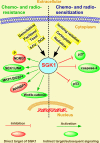SGK1 in Human Cancer: Emerging Roles and Mechanisms
- PMID: 33542904
- PMCID: PMC7851074
- DOI: 10.3389/fonc.2020.608722
SGK1 in Human Cancer: Emerging Roles and Mechanisms
Abstract
Serum and glucocorticoid-induced protein kinase 1 (SGK1) is a member of the "AGC" subfamily of protein kinases, which shares structural and functional similarities with the AKT family of kinases and displays serine/threonine kinase activity. Aberrant expression of SGK1 has profound cellular consequences and is closely correlated with human cancer. SGK1 is considered a canonical factor affecting the expression and signal transduction of multiple genes involved in the genesis and development of many human cancers. Abnormal expression of SGK1 has been found in tissue and may hopefully become a useful indicator of cancer progression. In addition, SGK1 acts as a prognostic factor for cancer patient survival. This review systematically summarizes and discusses the role of SGK1 as a diagnostic and prognostic biomarker of diverse cancer types; focuses on its essential roles and functions in tumorigenesis, cancer cell proliferation, apoptosis, invasion, metastasis, autophagy, metabolism, and therapy resistance and in the tumor microenvironment; and finally summarizes the current understanding of the regulatory mechanisms of SGK1 at the molecular level. Taken together, this evidence highlights the crucial role of SGK1 in tumorigenesis and cancer progression, revealing why it has emerged as a potential target for cancer therapy.
Keywords: autophagy; metabolism; serum and glucocorticoid-induced protein kinase 1; therapeutic resistance; tumor microenvironment.
Copyright © 2021 Sang, Kong, Zhang, Zhang, Cao, Duan, Sun, Tao and Liu.
Conflict of interest statement
The authors declare that the research was conducted in the absence of any commercial or financial relationships that could be construed as a potential conflict of interest.
Figures





Similar articles
-
SGK1, autophagy and cancer: an overview.Mol Biol Rep. 2022 Jan;49(1):675-685. doi: 10.1007/s11033-021-06836-6. Epub 2021 Oct 20. Mol Biol Rep. 2022. PMID: 34669124 Review.
-
The prospect of serum and glucocorticoid-inducible kinase 1 (SGK1) in cancer therapy: a rising star.Ther Adv Med Oncol. 2020 Jul 15;12:1758835920940946. doi: 10.1177/1758835920940946. eCollection 2020. Ther Adv Med Oncol. 2020. PMID: 32728395 Free PMC article. Review.
-
The SGK1 inhibitor SI113 induces autophagy, apoptosis, and endoplasmic reticulum stress in endometrial cancer cells.J Cell Physiol. 2017 Dec;232(12):3735-3743. doi: 10.1002/jcp.25850. Epub 2017 Apr 27. J Cell Physiol. 2017. PMID: 28177128
-
mTOR complex 2 (mTORC2) controls hydrophobic motif phosphorylation and activation of serum- and glucocorticoid-induced protein kinase 1 (SGK1).Biochem J. 2008 Dec 15;416(3):375-85. doi: 10.1042/BJ20081668. Biochem J. 2008. PMID: 18925875
-
Serum and glucocorticoid-regulated kinase 1: Structure, biological functions, and its inhibitors.Front Pharmacol. 2022 Nov 15;13:1036844. doi: 10.3389/fphar.2022.1036844. eCollection 2022. Front Pharmacol. 2022. PMID: 36457711 Free PMC article. Review.
Cited by
-
NDRG1 acts as an oncogene in triple-negative breast cancer and its loss sensitizes cells to mitochondrial iron chelation.Front Pharmacol. 2024 Jun 25;15:1422369. doi: 10.3389/fphar.2024.1422369. eCollection 2024. Front Pharmacol. 2024. PMID: 38983911 Free PMC article.
-
Circulatory extracellular vesicle derived miR-195-5p promotes cellular apoptosis and suppresses cell proliferation in the buffalo endometrial primary cell culture.Sci Rep. 2023 Oct 4;13(1):16703. doi: 10.1038/s41598-023-43530-y. Sci Rep. 2023. PMID: 37794118 Free PMC article.
-
Potential role of endoplasmic reticulum stress in doxorubicin-induced cardiotoxicity-an update.Front Pharmacol. 2024 Aug 12;15:1415108. doi: 10.3389/fphar.2024.1415108. eCollection 2024. Front Pharmacol. 2024. PMID: 39188945 Free PMC article. Review.
-
Melatonin, BAG-1 and cortisol circadian interactions in tumor pathogenesis and patterned immune responses.Explor Target Antitumor Ther. 2023;4(5):962-993. doi: 10.37349/etat.2023.00176. Epub 2023 Oct 25. Explor Target Antitumor Ther. 2023. PMID: 37970210 Free PMC article. Review.
-
Co-culture model of B-cell acute lymphoblastic leukemia recapitulates a transcription signature of chemotherapy-refractory minimal residual disease.Sci Rep. 2021 Aug 4;11(1):15840. doi: 10.1038/s41598-021-95039-x. Sci Rep. 2021. PMID: 34349149 Free PMC article.
References
-
- Webster MK, Goya L, Firestone GL. Immediate-early transcriptional regulation and rapid mRNA turnover of a putative serine/threonine protein kinase. J Biol Chem (1993) 268:11482–5. - PubMed
-
- Maiyar AC, Leong ML, Firestone GL. Importin-alpha mediates the regulated nuclear targeting of serum- and glucocorticoid-inducible protein kinase (Sgk) by recognition of a nuclear localization signal in the kinase central domain. Mol Biol Cell (2003) 14:1221–39. 10.1091/mbc.e02-03-0170 - DOI - PMC - PubMed
Publication types
LinkOut - more resources
Full Text Sources
Other Literature Sources

